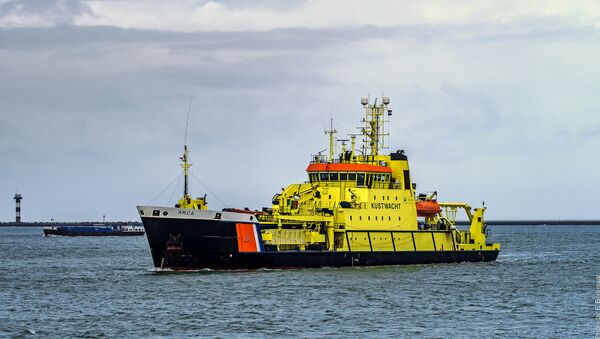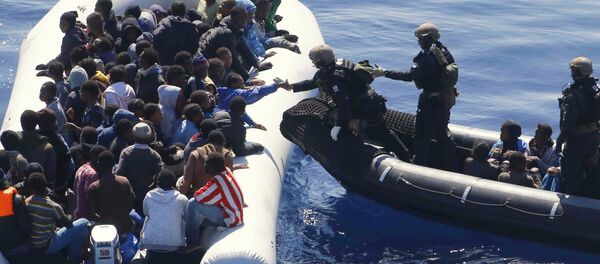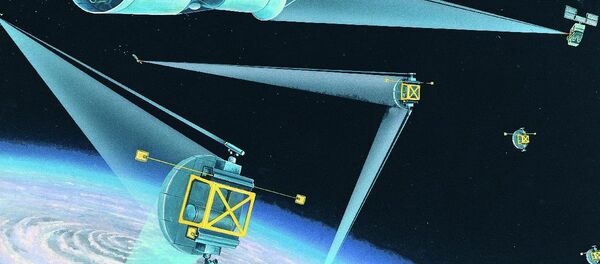In the last two months around 75 ships entered Dutch waters with fake registration details, possibly altered to conceal earlier voyages, according to an Israeli firm specializing in maritime data.
"Such movements can be an indication of illegal activities," said Ami Daniel, director of Windward.
More than 480 ships entered Dutch waters with their satellite signal out of operation.
"Sometimes ships which have their signals for years suddenly turn it off for hours or days. There is no logical explanation to do that. Insurance companies demand it, "said Daniel.
The Dutch Coastguard told the Algemeen Dagblad newspaper: "A GPS not sending a signal can be due to a meteorological failure, but unfortunately, malicious motives cannot be ruled out."
"Terrorism and people smuggling make for good headlines, but the reality of what happened with most of these ships is likely much more dull," Gary Howard, news editor at shipping website Lloyd's List, told Sputnik.
The news comes only days after a German navy ship intercepted a ship off the Libyan coast, which was carrying weapons and had its satellite tracker switched off, which is the equivalent of a car driving in the dark without any lights.
Every day thousands of ships pass through the world's shipping lanes, carrying oil, raw materials, containers and passengers to ports often on the opposite side of the globe.
Their owners keep track of them by means of an Automatic Identification System (AIS) which is also used for navigation, allowing ships' captains to avoid collisions and helping coastguards to monitor vessels which are off track.
While ships do have GPS receivers on board to determine the latitude, longitude and time stamp data for a vessel, the information is transmitted by AIS via VHF radio waves, and these are subject to variable performance levels.
It was reported today that the captain of a Panamanian-flagged vessel, the Van Manila, had been detained in Shanghai for an alleged hit-and-run.
Container ship VAN MANILA arrested after deadly collision which claimed 12 lives, Shanghai https://t.co/4Qzm2o2W2Q pic.twitter.com/HvxEBjNv0l
— Voytenko Mikhail (@Maritime_Bullet) May 4, 2017
Last month a cargo ship, the Xiang Zhou, sank off the Chinese coast and 12 crewmen remain missing. The Van Manila was in the area and allegedly switched off its AIS and sailed away.
Merchant shipping is monitored by commercial satellites but earlier this year Russian Defense Minister Sergei Shoigu announced the Liana satellite, which was due to be completed later this year, would be able to keep track of all ships, boats and even submarines on the planet.
But AIS only works if the ship has its device switched on. In March, a freighter was spotted a few miles from the Lebanese port of Tripoli. Two weeks later, after disappearing from the AIS system several times, it turned up at the port of Eemshaven, near Groningen in the Netherlands.
The officials in Eemshaven asked the ship's captain which port he last called in but they did not check his AIS data. The National Coordinator for Terrorism and Security in the Netherlands said he "recognizes the problem."
In an article earlier this year, Lloyd's List said their database showed 3,869 vessels had called 24,868 times in what are known as "sanctioned" ports in the last 12 months. A port is sanctioned if it is in a country on which sanctions have been imposed, for example North Korea, or if it is in a lawless area or somewhere where customs controls are very weak.
But the Lloyd's List article said: "The activities of these 3,869 vessels may or may not have been illicit, but jumping to the conclusion that they were is a dangerous path to go down without context and an understanding of the intricacies of AIS technology."
"HM Coastguard monitor vessel movements within the United Kingdom search and rescue region to ensure maritime safety. Any suspicious activity recognized would be passed on to the appropriate authorities," Sam Sinclair from Britain's Maritime & Coastguard Agency told Sputnik.




